Navigating Transitions 2018: Assessment 4 - Learning Plan Reflection
VerifiedAdded on 2023/06/10
|6
|1509
|188
Report
AI Summary
This report is a reflection on a student's learning experience during their transition to professional nursing practice. The student evaluates their learning goals, what worked well, and what didn't, incorporating evidence-based practices and hospital policies. The analysis delves into the consistency of their learning with current best practices and limitations encountered in translating evidence into practice. The reflection concludes with an action plan to improve clinical performance, focusing on developing effective safety culture systems and promoting meaningful partnerships during clinical practice. References to relevant academic sources are included to support the analysis and reflection process.
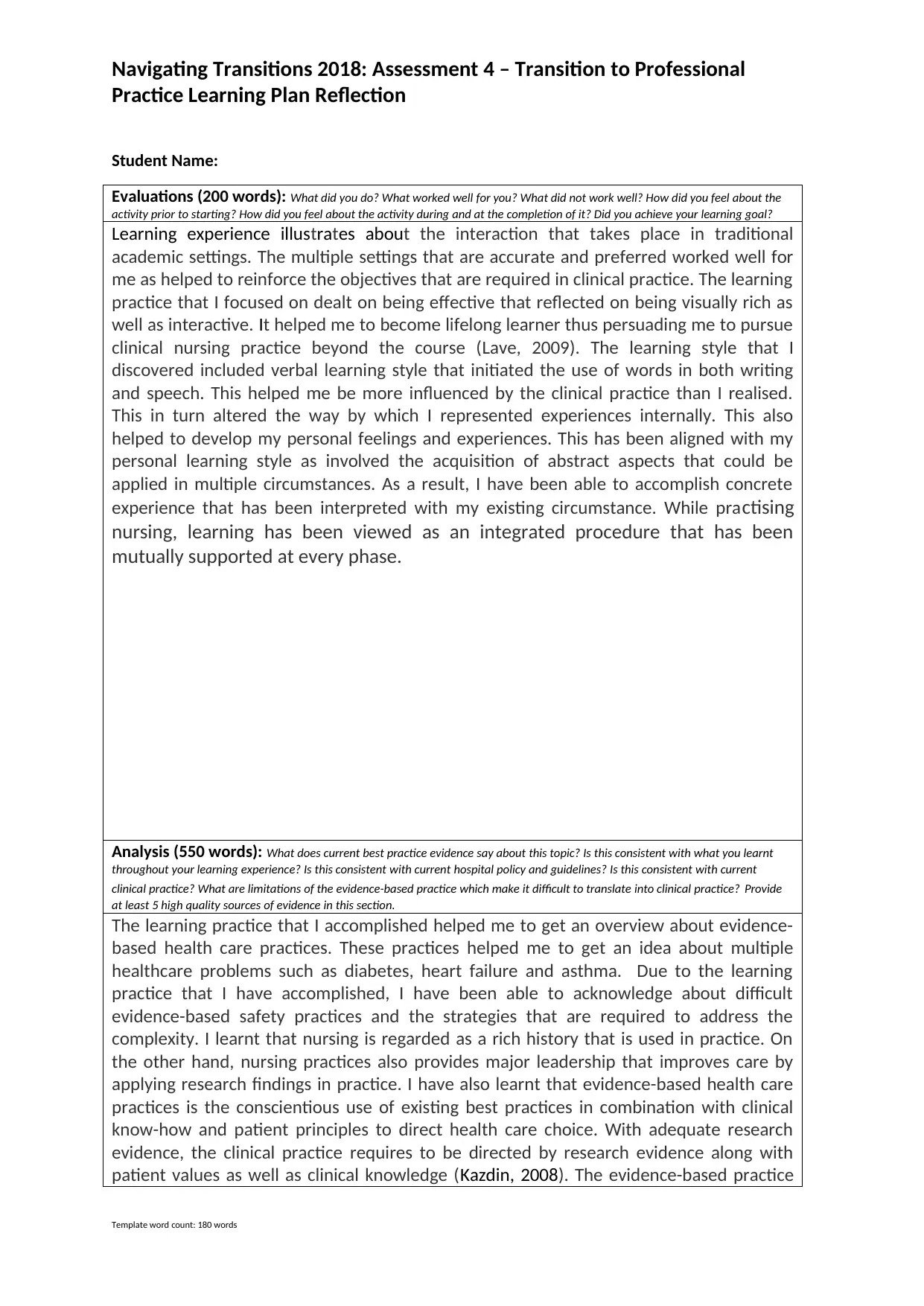
Navigating Transitions 2018: Assessment 4 – Transition to Professional
Practice Learning Plan Reflection
Student Name:
Evaluations (200 words): What did you do? What worked well for you? What did not work well? How did you feel about the
activity prior to starting? How did you feel about the activity during and at the completion of it? Did you achieve your learning goal?
Learning experience illustrates about the interaction that takes place in traditional
academic settings. The multiple settings that are accurate and preferred worked well for
me as helped to reinforce the objectives that are required in clinical practice. The learning
practice that I focused on dealt on being effective that reflected on being visually rich as
well as interactive. It helped me to become lifelong learner thus persuading me to pursue
clinical nursing practice beyond the course (Lave, 2009). The learning style that I
discovered included verbal learning style that initiated the use of words in both writing
and speech. This helped me be more influenced by the clinical practice than I realised.
This in turn altered the way by which I represented experiences internally. This also
helped to develop my personal feelings and experiences. This has been aligned with my
personal learning style as involved the acquisition of abstract aspects that could be
applied in multiple circumstances. As a result, I have been able to accomplish concrete
experience that has been interpreted with my existing circumstance. While practising
nursing, learning has been viewed as an integrated procedure that has been
mutually supported at every phase.
Analysis (550 words): What does current best practice evidence say about this topic? Is this consistent with what you learnt
throughout your learning experience? Is this consistent with current hospital policy and guidelines? Is this consistent with current
clinical practice? What are limitations of the evidence-based practice which make it difficult to translate into clinical practice? Provide
at least 5 high quality sources of evidence in this section.
The learning practice that I accomplished helped me to get an overview about evidence-
based health care practices. These practices helped me to get an idea about multiple
healthcare problems such as diabetes, heart failure and asthma. Due to the learning
practice that I have accomplished, I have been able to acknowledge about difficult
evidence-based safety practices and the strategies that are required to address the
complexity. I learnt that nursing is regarded as a rich history that is used in practice. On
the other hand, nursing practices also provides major leadership that improves care by
applying research findings in practice. I have also learnt that evidence-based health care
practices is the conscientious use of existing best practices in combination with clinical
know-how and patient principles to direct health care choice. With adequate research
evidence, the clinical practice requires to be directed by research evidence along with
patient values as well as clinical knowledge (Kazdin, 2008). The evidence-based practice
Template word count: 180 words
Practice Learning Plan Reflection
Student Name:
Evaluations (200 words): What did you do? What worked well for you? What did not work well? How did you feel about the
activity prior to starting? How did you feel about the activity during and at the completion of it? Did you achieve your learning goal?
Learning experience illustrates about the interaction that takes place in traditional
academic settings. The multiple settings that are accurate and preferred worked well for
me as helped to reinforce the objectives that are required in clinical practice. The learning
practice that I focused on dealt on being effective that reflected on being visually rich as
well as interactive. It helped me to become lifelong learner thus persuading me to pursue
clinical nursing practice beyond the course (Lave, 2009). The learning style that I
discovered included verbal learning style that initiated the use of words in both writing
and speech. This helped me be more influenced by the clinical practice than I realised.
This in turn altered the way by which I represented experiences internally. This also
helped to develop my personal feelings and experiences. This has been aligned with my
personal learning style as involved the acquisition of abstract aspects that could be
applied in multiple circumstances. As a result, I have been able to accomplish concrete
experience that has been interpreted with my existing circumstance. While practising
nursing, learning has been viewed as an integrated procedure that has been
mutually supported at every phase.
Analysis (550 words): What does current best practice evidence say about this topic? Is this consistent with what you learnt
throughout your learning experience? Is this consistent with current hospital policy and guidelines? Is this consistent with current
clinical practice? What are limitations of the evidence-based practice which make it difficult to translate into clinical practice? Provide
at least 5 high quality sources of evidence in this section.
The learning practice that I accomplished helped me to get an overview about evidence-
based health care practices. These practices helped me to get an idea about multiple
healthcare problems such as diabetes, heart failure and asthma. Due to the learning
practice that I have accomplished, I have been able to acknowledge about difficult
evidence-based safety practices and the strategies that are required to address the
complexity. I learnt that nursing is regarded as a rich history that is used in practice. On
the other hand, nursing practices also provides major leadership that improves care by
applying research findings in practice. I have also learnt that evidence-based health care
practices is the conscientious use of existing best practices in combination with clinical
know-how and patient principles to direct health care choice. With adequate research
evidence, the clinical practice requires to be directed by research evidence along with
patient values as well as clinical knowledge (Kazdin, 2008). The evidence-based practice
Template word count: 180 words
Paraphrase This Document
Need a fresh take? Get an instant paraphrase of this document with our AI Paraphraser
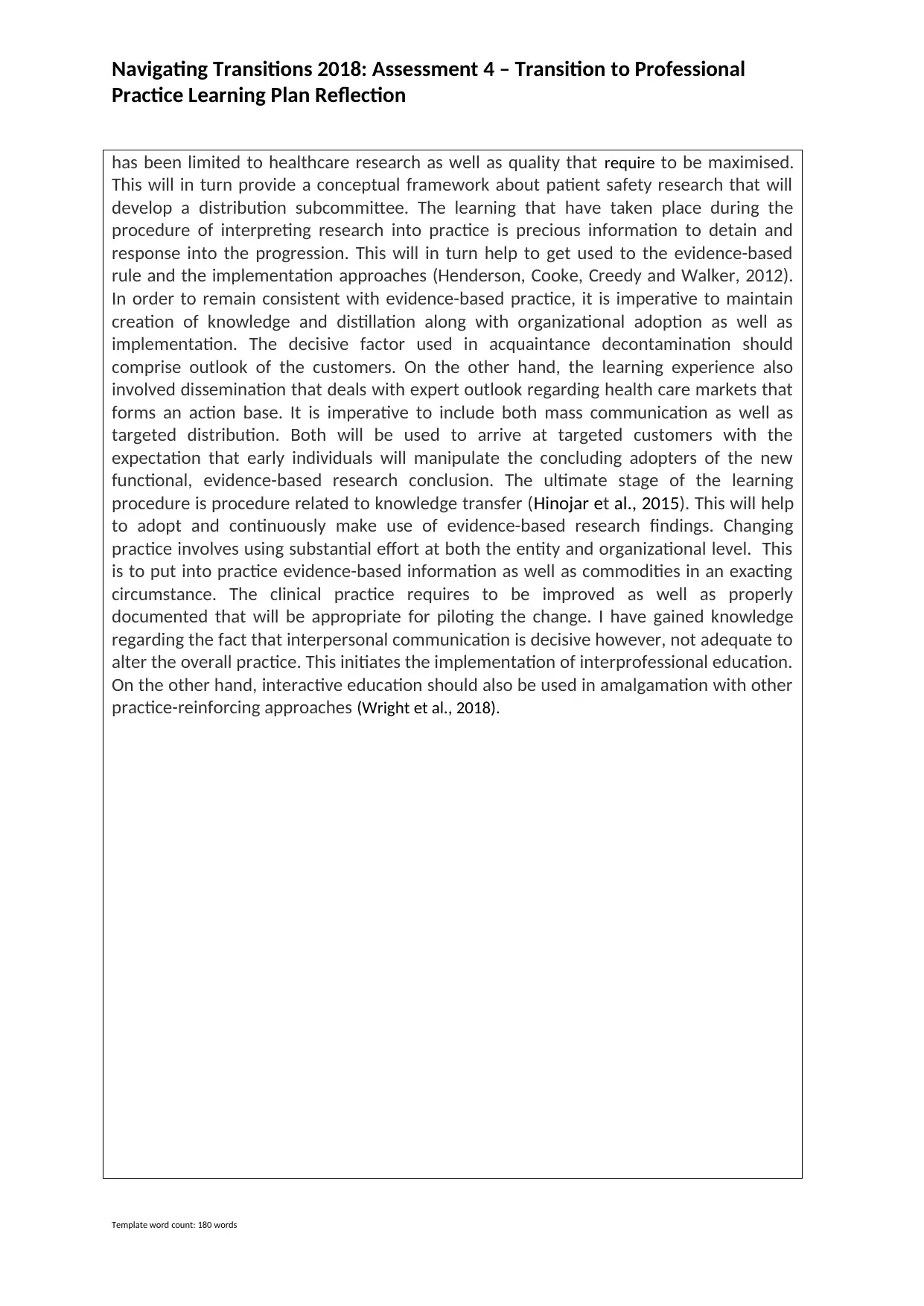
Navigating Transitions 2018: Assessment 4 – Transition to Professional
Practice Learning Plan Reflection
has been limited to healthcare research as well as quality that require to be maximised.
This will in turn provide a conceptual framework about patient safety research that will
develop a distribution subcommittee. The learning that have taken place during the
procedure of interpreting research into practice is precious information to detain and
response into the progression. This will in turn help to get used to the evidence-based
rule and the implementation approaches (Henderson, Cooke, Creedy and Walker, 2012).
In order to remain consistent with evidence-based practice, it is imperative to maintain
creation of knowledge and distillation along with organizational adoption as well as
implementation. The decisive factor used in acquaintance decontamination should
comprise outlook of the customers. On the other hand, the learning experience also
involved dissemination that deals with expert outlook regarding health care markets that
forms an action base. It is imperative to include both mass communication as well as
targeted distribution. Both will be used to arrive at targeted customers with the
expectation that early individuals will manipulate the concluding adopters of the new
functional, evidence-based research conclusion. The ultimate stage of the learning
procedure is procedure related to knowledge transfer (Hinojar et al., 2015). This will help
to adopt and continuously make use of evidence-based research findings. Changing
practice involves using substantial effort at both the entity and organizational level. This
is to put into practice evidence-based information as well as commodities in an exacting
circumstance. The clinical practice requires to be improved as well as properly
documented that will be appropriate for piloting the change. I have gained knowledge
regarding the fact that interpersonal communication is decisive however, not adequate to
alter the overall practice. This initiates the implementation of interprofessional education.
On the other hand, interactive education should also be used in amalgamation with other
practice-reinforcing approaches (Wright et al., 2018).
Template word count: 180 words
Practice Learning Plan Reflection
has been limited to healthcare research as well as quality that require to be maximised.
This will in turn provide a conceptual framework about patient safety research that will
develop a distribution subcommittee. The learning that have taken place during the
procedure of interpreting research into practice is precious information to detain and
response into the progression. This will in turn help to get used to the evidence-based
rule and the implementation approaches (Henderson, Cooke, Creedy and Walker, 2012).
In order to remain consistent with evidence-based practice, it is imperative to maintain
creation of knowledge and distillation along with organizational adoption as well as
implementation. The decisive factor used in acquaintance decontamination should
comprise outlook of the customers. On the other hand, the learning experience also
involved dissemination that deals with expert outlook regarding health care markets that
forms an action base. It is imperative to include both mass communication as well as
targeted distribution. Both will be used to arrive at targeted customers with the
expectation that early individuals will manipulate the concluding adopters of the new
functional, evidence-based research conclusion. The ultimate stage of the learning
procedure is procedure related to knowledge transfer (Hinojar et al., 2015). This will help
to adopt and continuously make use of evidence-based research findings. Changing
practice involves using substantial effort at both the entity and organizational level. This
is to put into practice evidence-based information as well as commodities in an exacting
circumstance. The clinical practice requires to be improved as well as properly
documented that will be appropriate for piloting the change. I have gained knowledge
regarding the fact that interpersonal communication is decisive however, not adequate to
alter the overall practice. This initiates the implementation of interprofessional education.
On the other hand, interactive education should also be used in amalgamation with other
practice-reinforcing approaches (Wright et al., 2018).
Template word count: 180 words
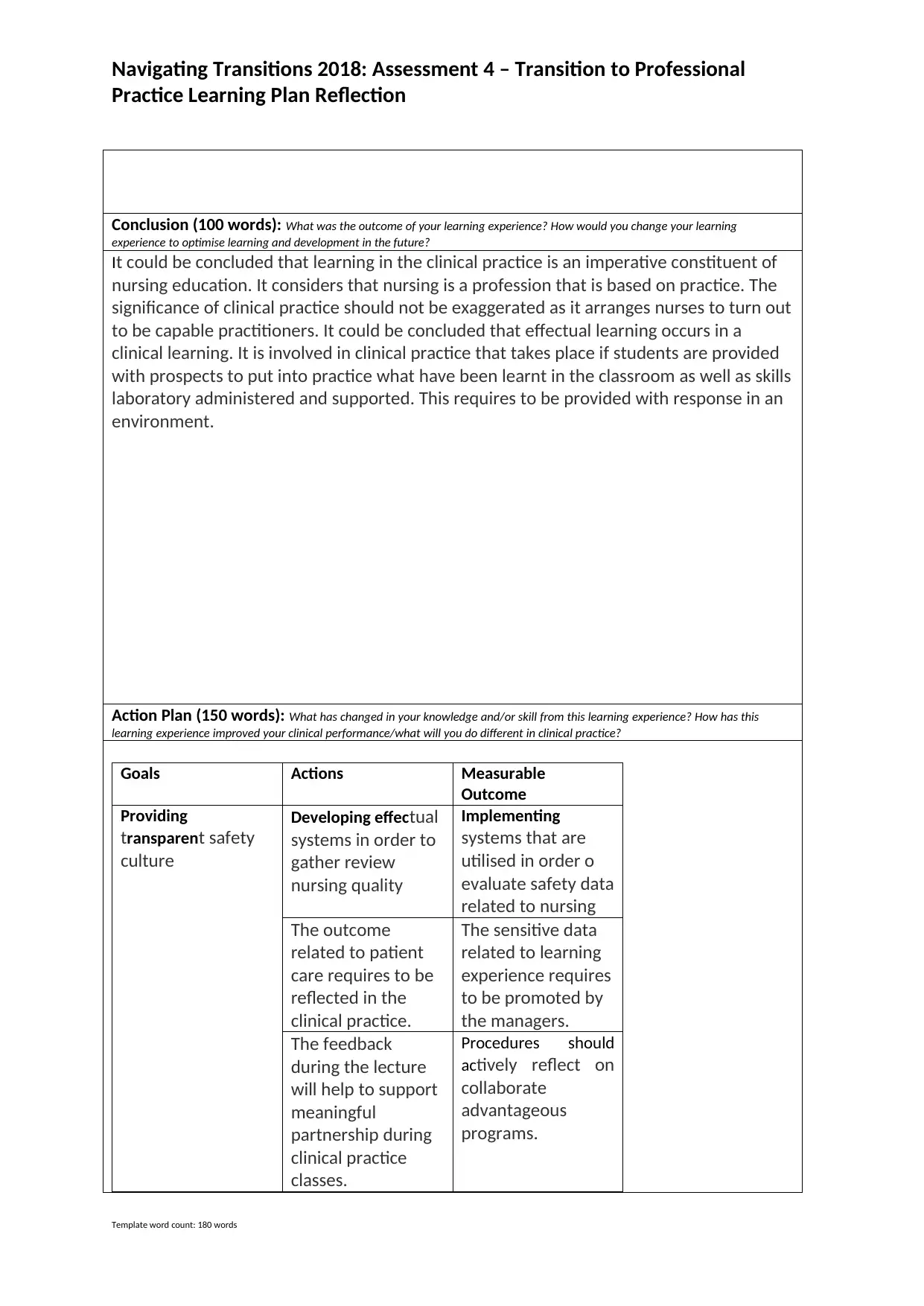
Navigating Transitions 2018: Assessment 4 – Transition to Professional
Practice Learning Plan Reflection
Conclusion (100 words): What was the outcome of your learning experience? How would you change your learning
experience to optimise learning and development in the future?
It could be concluded that learning in the clinical practice is an imperative constituent of
nursing education. It considers that nursing is a profession that is based on practice. The
significance of clinical practice should not be exaggerated as it arranges nurses to turn out
to be capable practitioners. It could be concluded that effectual learning occurs in a
clinical learning. It is involved in clinical practice that takes place if students are provided
with prospects to put into practice what have been learnt in the classroom as well as skills
laboratory administered and supported. This requires to be provided with response in an
environment.
Action Plan (150 words): What has changed in your knowledge and/or skill from this learning experience? How has this
learning experience improved your clinical performance/what will you do different in clinical practice?
Goals Actions Measurable
Outcome
Providing
transparent safety
culture
Developing effectual
systems in order to
gather review
nursing quality
Implementing
systems that are
utilised in order o
evaluate safety data
related to nursing
The outcome
related to patient
care requires to be
reflected in the
clinical practice.
The sensitive data
related to learning
experience requires
to be promoted by
the managers.
The feedback
during the lecture
will help to support
meaningful
partnership during
clinical practice
classes.
Procedures should
actively reflect on
collaborate
advantageous
programs.
Template word count: 180 words
Practice Learning Plan Reflection
Conclusion (100 words): What was the outcome of your learning experience? How would you change your learning
experience to optimise learning and development in the future?
It could be concluded that learning in the clinical practice is an imperative constituent of
nursing education. It considers that nursing is a profession that is based on practice. The
significance of clinical practice should not be exaggerated as it arranges nurses to turn out
to be capable practitioners. It could be concluded that effectual learning occurs in a
clinical learning. It is involved in clinical practice that takes place if students are provided
with prospects to put into practice what have been learnt in the classroom as well as skills
laboratory administered and supported. This requires to be provided with response in an
environment.
Action Plan (150 words): What has changed in your knowledge and/or skill from this learning experience? How has this
learning experience improved your clinical performance/what will you do different in clinical practice?
Goals Actions Measurable
Outcome
Providing
transparent safety
culture
Developing effectual
systems in order to
gather review
nursing quality
Implementing
systems that are
utilised in order o
evaluate safety data
related to nursing
The outcome
related to patient
care requires to be
reflected in the
clinical practice.
The sensitive data
related to learning
experience requires
to be promoted by
the managers.
The feedback
during the lecture
will help to support
meaningful
partnership during
clinical practice
classes.
Procedures should
actively reflect on
collaborate
advantageous
programs.
Template word count: 180 words
⊘ This is a preview!⊘
Do you want full access?
Subscribe today to unlock all pages.

Trusted by 1+ million students worldwide
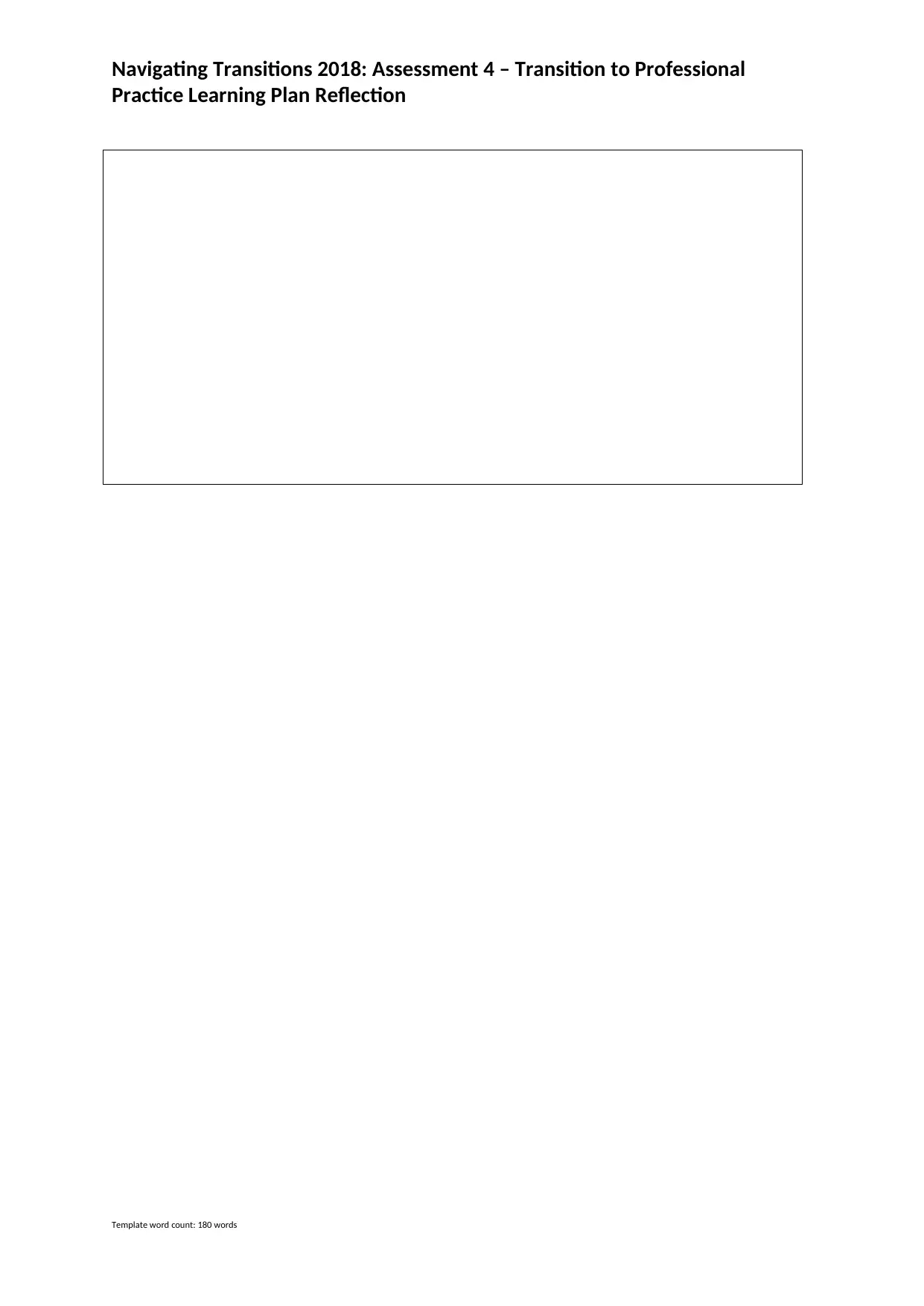
Navigating Transitions 2018: Assessment 4 – Transition to Professional
Practice Learning Plan Reflection
Template word count: 180 words
Practice Learning Plan Reflection
Template word count: 180 words
Paraphrase This Document
Need a fresh take? Get an instant paraphrase of this document with our AI Paraphraser
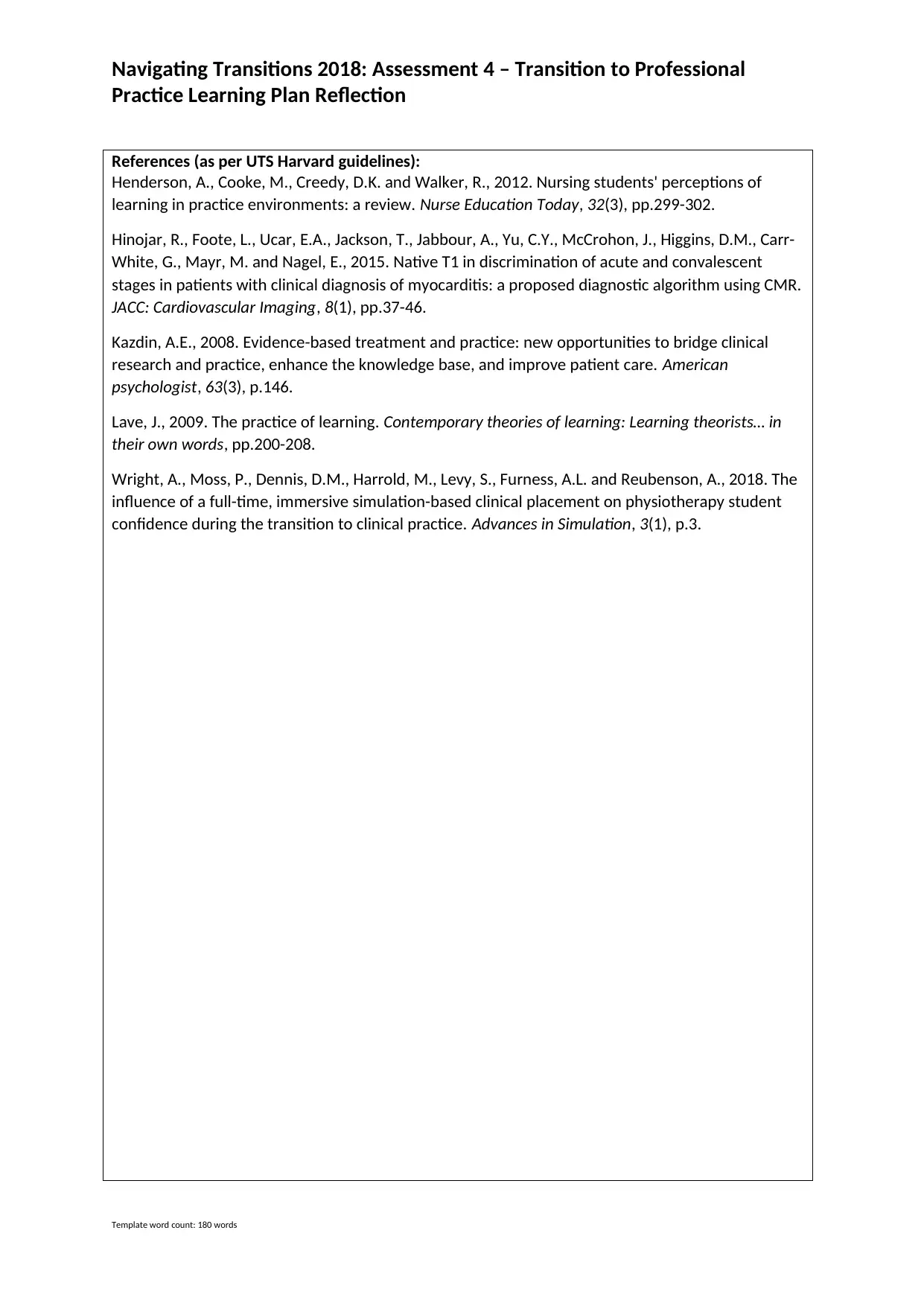
Navigating Transitions 2018: Assessment 4 – Transition to Professional
Practice Learning Plan Reflection
References (as per UTS Harvard guidelines):
Henderson, A., Cooke, M., Creedy, D.K. and Walker, R., 2012. Nursing students' perceptions of
learning in practice environments: a review. Nurse Education Today, 32(3), pp.299-302.
Hinojar, R., Foote, L., Ucar, E.A., Jackson, T., Jabbour, A., Yu, C.Y., McCrohon, J., Higgins, D.M., Carr-
White, G., Mayr, M. and Nagel, E., 2015. Native T1 in discrimination of acute and convalescent
stages in patients with clinical diagnosis of myocarditis: a proposed diagnostic algorithm using CMR.
JACC: Cardiovascular Imaging, 8(1), pp.37-46.
Kazdin, A.E., 2008. Evidence-based treatment and practice: new opportunities to bridge clinical
research and practice, enhance the knowledge base, and improve patient care. American
psychologist, 63(3), p.146.
Lave, J., 2009. The practice of learning. Contemporary theories of learning: Learning theorists… in
their own words, pp.200-208.
Wright, A., Moss, P., Dennis, D.M., Harrold, M., Levy, S., Furness, A.L. and Reubenson, A., 2018. The
influence of a full-time, immersive simulation-based clinical placement on physiotherapy student
confidence during the transition to clinical practice. Advances in Simulation, 3(1), p.3.
Template word count: 180 words
Practice Learning Plan Reflection
References (as per UTS Harvard guidelines):
Henderson, A., Cooke, M., Creedy, D.K. and Walker, R., 2012. Nursing students' perceptions of
learning in practice environments: a review. Nurse Education Today, 32(3), pp.299-302.
Hinojar, R., Foote, L., Ucar, E.A., Jackson, T., Jabbour, A., Yu, C.Y., McCrohon, J., Higgins, D.M., Carr-
White, G., Mayr, M. and Nagel, E., 2015. Native T1 in discrimination of acute and convalescent
stages in patients with clinical diagnosis of myocarditis: a proposed diagnostic algorithm using CMR.
JACC: Cardiovascular Imaging, 8(1), pp.37-46.
Kazdin, A.E., 2008. Evidence-based treatment and practice: new opportunities to bridge clinical
research and practice, enhance the knowledge base, and improve patient care. American
psychologist, 63(3), p.146.
Lave, J., 2009. The practice of learning. Contemporary theories of learning: Learning theorists… in
their own words, pp.200-208.
Wright, A., Moss, P., Dennis, D.M., Harrold, M., Levy, S., Furness, A.L. and Reubenson, A., 2018. The
influence of a full-time, immersive simulation-based clinical placement on physiotherapy student
confidence during the transition to clinical practice. Advances in Simulation, 3(1), p.3.
Template word count: 180 words
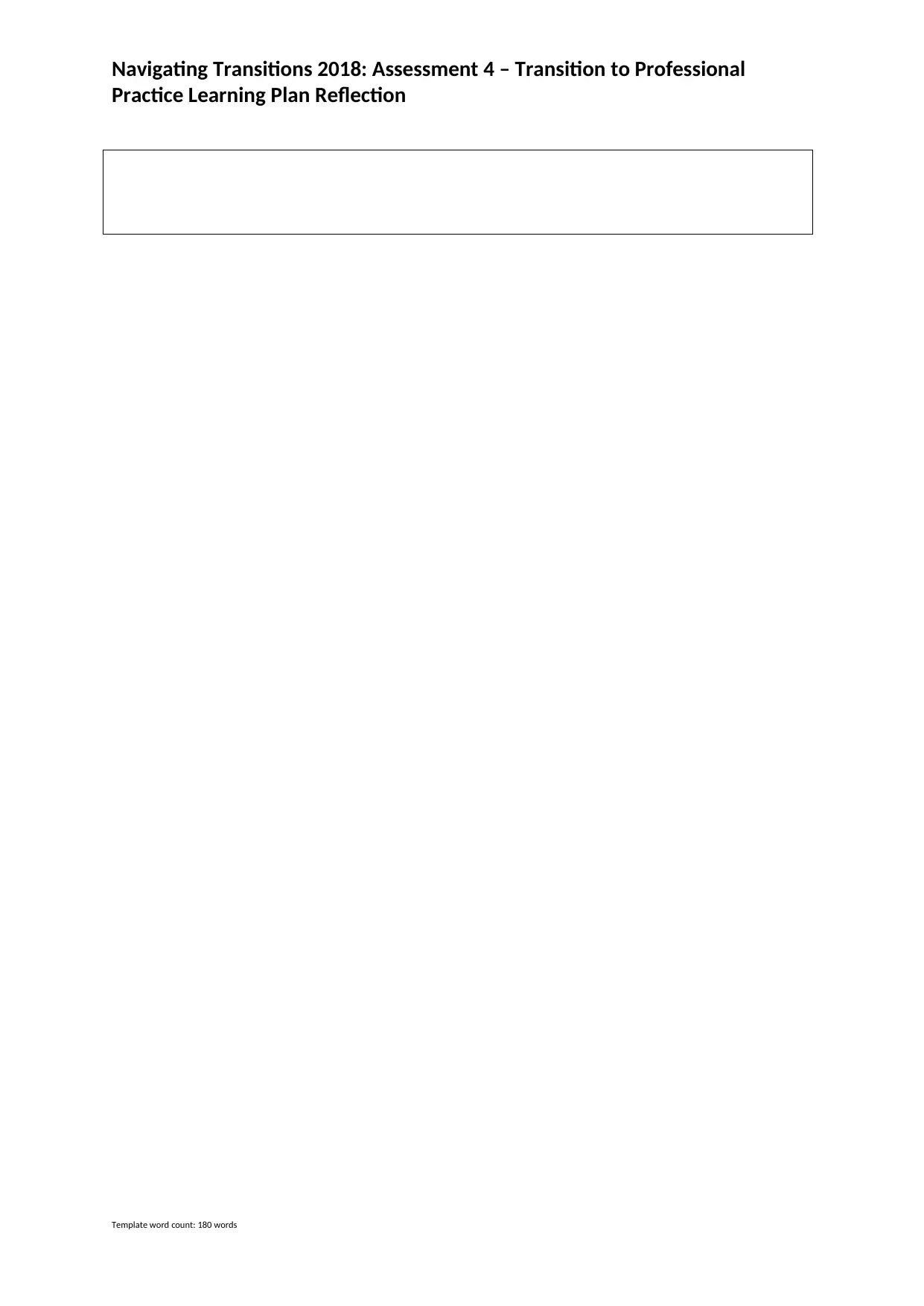
Navigating Transitions 2018: Assessment 4 – Transition to Professional
Practice Learning Plan Reflection
Template word count: 180 words
Practice Learning Plan Reflection
Template word count: 180 words
⊘ This is a preview!⊘
Do you want full access?
Subscribe today to unlock all pages.

Trusted by 1+ million students worldwide
1 out of 6
Related Documents
Your All-in-One AI-Powered Toolkit for Academic Success.
+13062052269
info@desklib.com
Available 24*7 on WhatsApp / Email
![[object Object]](/_next/static/media/star-bottom.7253800d.svg)
Unlock your academic potential
Copyright © 2020–2026 A2Z Services. All Rights Reserved. Developed and managed by ZUCOL.




